Nigerian States And What They Produce - Politics - Nairaland
Nairaland Forum / Nairaland / General / Politics / Nigerian States And What They Produce (269644 Views)
List Of Nigerian States By Area / OMITTED TRUTH/DEBUNKING Lies...Nigeria States And What They Produce / Workers' Salaries: States And Number Of Months They Owe - Vanguard (snapshot) (2) (3) (4)
(1) (2) (3) (4) (5) (6) (7) (8) (9) (10) ... (18) (Reply) (Go Down)
| Nigerian States And What They Produce by scholes0(m): 8:50pm On Aug 12, 2015 |
[size=14pt]Groundnut production, Nigeria[/size] In Nigeria, the leading producing states include: Niger, Kano, Jigawa, Zamfara,Kebbi, Sokoto, Katsina, Kaduna, Adamawa, Yobe, Borno, Taraba, Plateau, Nasarawa, Bauchi, and Gombe States (NAERL, 2011)http://www.foodandagriculturejournal.com/41.pdf  [size=14pt]Oil Palm production, Nigeria[/size] Oil palm in Nigeria grown in the coastal belt, which varies in depth from 100 to 150 miles, and a riverine belt which follows the valley of the Niger and Benue for a distance of 450 Miles from the sea. The main oil palm producing states are: Cross River, Akwa Ibom, Ekiti, Delta, Bayelsa, Ogun, Rivers, Anambra, Ondo, Enugu, Imo, Oyo, Abia, Edo, Ogun, with Cross River, Delta, Ondo and Edo being the highest exporters in commercial quantity 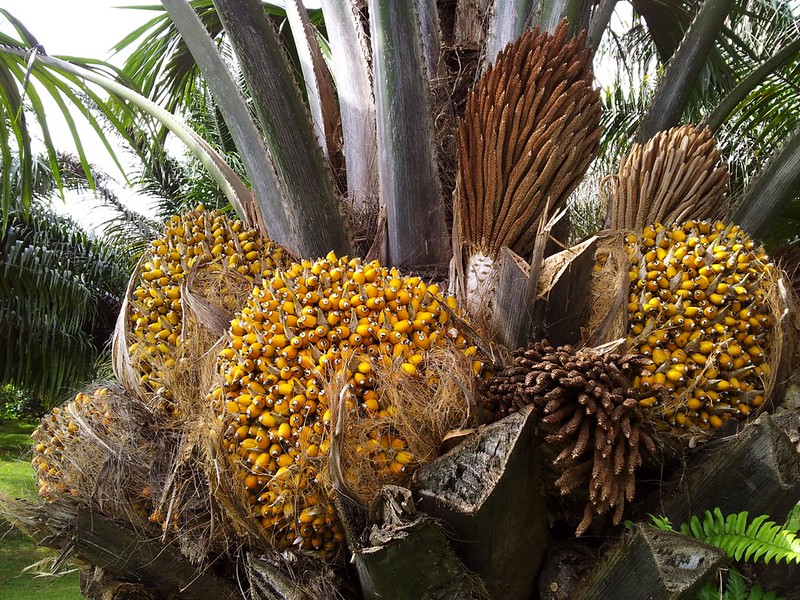 [size=14pt]Cocoa production, Nigeria[/size] Although cocoa is mostly grown in fourteen of the Thirty-six Nigerian States, the main producing states (aside from Cross River, in the South East) are located in the South West of the country, which is the highest Cocoa producing region (80%), with most production areas located in: Ekiti, Ogun, Ondo, Osun and Edohttp://www.fao.org/3/a-at586e.pdf  [size=14pt]Bitumen / Oil Sand reserves, Nigeria[/size] Bitumen was first discovered in 1900, with focused exploration beginning in 1905. Bitumen deposits are found in Lagos State, Ogun State, Ondo State, and Edo State. Conoco has performed a technical and economic evaluation of these deposits, and believes there to be over Twenty-Seven Billion barrels of oil in these tar sands and bitumen seepages [size=14pt]Cattle Hide and Beef[/size] Most of Nigeria's cattle and cattle related products is sourced from the Northern portions of the country, in states like: Adamawa, Bauchi, Gombe, Niger, Kaduna, Zamfara, Borno, Taraba, Jigawa, Kebbi and also Oyo Kwara, Nassarawa to lesser extents  [size=14pt]Wheat production, Nigeria[/size] Nigeria’s domestic wheat production is small at 70,000 tons in MY 2013/2014. Nigeria’s northern states of Bornu, Yobe, Jigawa, Kano, Zamfara, Katsina, Adamawa, Sokoto and Kebbi, are major wheat growing areas, where it is known by the local name "Alikama"http://gain.fas.usda.gov/Recent%20GAIN%20Publications/Grain%20and%20Feed%20Annual_Lagos_Nigeria_3-13-2014.pdf [size=14pt]Sorghum production, Nigeria[/size] Production is forecast up by about 10 percent to 6.5 million tons in 2013/2014 as compared with 5.9 million tons in the season of 2012/2013. Nigeria is the largest sorghum producer in Africa, accounting for about 71 percent of the total regional sorghum output, 30-40 percent of total African production, and is the second largest world producer after the United States. Main producing states are: Zamfara, Niger, Plateau, Katsina, Kaduna, Benue, Kano, Bauchi, Bornohttp://gain.fas.usda.gov/Recent%20GAIN%20Publications/Grain%20and%20Feed%20Annual_Lagos_Nigeria_3-13-2014.pdf  [size=14pt]Tomato production, Nigeria[/size] Nigeria ranked 16th on the global tomato production scale, accounts for 10.79 per cent of Africa’s and 1.2 per cent of total world production of tomatoes. While tomatoes are cultivated in most states in the country, Jigawa, Katsina, Zamfara, Sokoto, Kaduna, Bauchi, Gombe, Taraba, Kano lead the pack in the commercial cultivation of the crop.http://kalusam./2013/09/11/the-great-tomato-waste-in-nigeria/ [size=14pt]Cement production, Nigeria[/size] Nigeria is the largest cement producer in Africa, and Ogun state has the largest concentration of limestone deposits in Nigeria especially in and around Ewekoro and Ibeshe, more than 50% the metric tonnes of cement produced locally in Nigeria, comes from Ogun . Today, Ogun state is the new Cement Capital of Africa, producing the same amount of Cement as South Africa, the continent's second largest economy. Other important producing states are: Kogi state around Obajana, Edo state around Akoko Edo - Okpella, Cross river state around Mfamosing, and to a lesser extent Nkalagu in Enugu state and Ashaka in Gombe statehttps://www.nairaland.com/2322312/ogun-state-nigerias-emerging-industrial www.nairaland.com/attachments/2424636_screenshot20150518at5_jpegbf8e1ee3608774f52838bd03cc3bcee3 [size=14pt]Timber and Wood products production, Nigeria[/size] The major wood processing industries in Nigeria are typically large capacity facilities industry such as large sawmills, plywood mill, pulp and paper plants and quite large numbers of small scale wood products manufacturing companies such as furniture industries, cabinet makers and carpentry. Round-wood in Nigeria comes mostly from the natural high forest zone of the country, in particular from the Southern States of Nigeria, but most especially in Ondo, Cross River, Ogun, Edo, Delta Ekiti, Osun and Oyo States of Nigeria which are the largest producers. The most important wood products, produced, consumed and traded in Nigeria are sawn-wood, plywood, particle board, news-print, printing and writing paper and other paper boards [size=14pt]Pepper production, Nigeria[/size] The greater part of pepper production in Nigeria is undertaken in the northern areas of the country, in Kaduna, Kano, Jigawa, Katsina, Sokoto, Plateau and Bauchi states. The natural features of these regions, especially the presence of flood-prone plains and river basins and above all the development of vast irrigated lands, create conditions that greatly favour the development of this crophttp://www.dnetrw.com/wp-content/uploads/fulltext/fulltext-2014103064845.pdf [size=14pt]Gold reserves, Nigeria[/size] Primary belt stretches from Osun-Ondo States in the southwest to Niger, Kaduna, Zamfara, Kebbi States in the northwest. Already Ratel has a provengold reserve of over 620,000 ounces just in their Iperindo property in Osun state in addition to other exploration activities being carried out across the countryhttp://www.australianmines.com.au/sites/4e12ba9050ee853e770086de/contents/content_instance/5044320150ee851ef6000da3/files/nigeria__minister_of_mines_presentaion_at_africa_down_under_.pdf  [size=14pt]Rubber production, Nigeria[/size] The Bulk of Nigeria's Rubber production come from the Southern states of Delta, Edo, Ondo, Ogun, Cross River  [size=14pt]Soybean Production, Nigeria[/size] Soybean was first introduced to Ibadan, Oyo State, Nigeria in 1908. Today, Nigeria is the largest producer of the crop for human and livestock feeds in West and Central Africa. At present, the major soybean producing states in the country are Benue, Kaduna, Taraba, Plateau and Niger in the central regions. Other growing areas include, Nasarawa, Kebbi, Kwara, Oyo, Jigawa, Borno, Bauchi, Lagos, Sokoto, Zamfara and FCT. The yield of soybean of 1,700 kg per hectare on research plots in Nigeriahttp://www.propcommaikarfi.org/wp-content/uploads/2013/08/28-Mapping-of-soybean-production-areas-in-Nigeria-3-07.pdf  [size=14pt]Maize/Corn production, Nigeria[/size] Maize/Corn is grown widely throughout the country. The Central states of Nigeria such as Niger, Kaduna, Taraba, Plateau, Adamawa 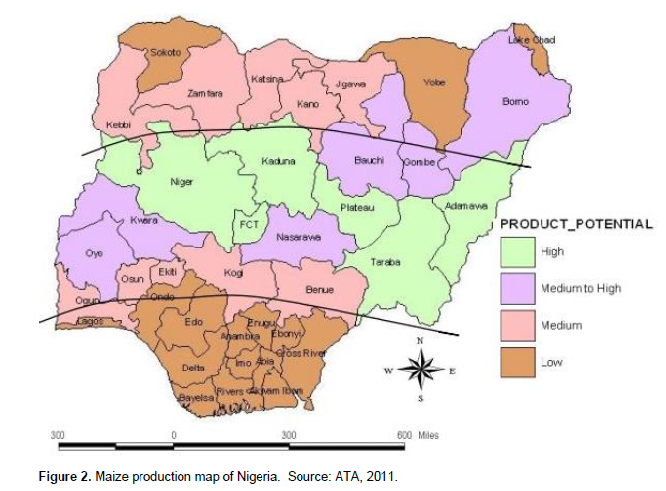 [size=14pt]Beans/Cowpea/Pulses production, Nigeria[/size] Cowpea is grown in Nigeria at varying degrees, but the crop seems to do best in the drier climates of the northern regions. Nigeria is the largest cowpea/pulses producer in All Africa, and the 4th largest producer in the World after India, Canada and Burma. The major growing/production areas in Nigeria are: Borno, Zamfara, Sokoto, Kano, Gombe and Yobe  [size=14pt]Cashew/ Cashew nut production, Nigeria[/size] Since 2008, Nigeria has become the largest producer of cashew nuts in the world. Nigeria was last the largest producer of cashew in 2010. Cashew nut production trends have varied over the decades. While Nigeria is the world’s 6th largest producer of cashew fruits, with annual production volume of about 120,000 tonnes. The Cashew Industry also provides about 600,000 jobs and a total annual trade worth N24billion, thus making the sector a major contributor to Nigeria’s non-oil GDP .It is widely grown in the southern states of Nigeria. Especially: Enugu, Oyo, Anambra, Kogi, Osun, Abia, Ondo, Benue, Cross River, Imo, Ekiti, Ebonyi, Kwarahttp://www.academicjournals.org/article/article1426244215_Adeigbe%20et%20al.pdf  [size=14pt]Cassava production, Nigeria[/size] Cassava (Manihot esculenta) production is vital to the economy of Nigeria as the country is the world's largest producer of the commodity. The crop is produced in 24 of the country's 36 states. In 1999, Nigeria produced 33 million tonnes, while a decade later, it produced approximately 45 million tonnes, which is almost 19% of production in the world. The average yield per hectare is 10.6 tonnes.- And it is a staple in many parts of the country. In Nigeria, cassava production is well-developed as an organized agricultural crop. It has well-established multiplication and processing techniques for food products and cattle feed. Main producing states are Imo, Ondo, Anambra, Kogi, Taraba, Cross River, Enugu, Ogun, Benue, Delta, Edohttps://en.wikipedia.org/wiki/Cassava_production_in_Nigeria  [size=14pt]Yam Production, Nigeria[/size] Nigeria is by far the world’s largest producer of yams, accounting for over 70–76 percent of the world production. According to the Food and Agricultural Organization report, in 1985, Nigeria produced 18.3 million tonnes of yam from 1.5 million hectares, representing 73.8 percent of total yam production in Africa. According to 2008 figures, yam production in Nigeria has nearly doubled since 1985, with Nigeria producing 35.017 million metric tonnes with value equivalent of US$5.654 billionThe major yam producing states in Nigeria are: Adamawa, Benue, Cross River, Delta, Edo, Ekiti, Imo, Kaduna, Kwara, Ogun, Ondo, Osun, Oyo, and Plateau. Benue state is however the largest producer.http://www.ajol.info/index.php/ejesm/article/viewFile/82843/72964  [size=14pt]Solar Power, Nigeria[/size] With the increasing advancements in technologies aimed at harnessing the power of the Sun, and the increasing rate at which solar farms are springing up everywhere, including here in our own Nigeria, it is noteworthy to know which Nigerian states offer the best opportunities for solar power. Most of these states are in the Northern portions of the country, most especially: Yobe, Kano, Bauchi, Jigawa, Katsina, Sokoto among others  [size=14pt]Coal Reserves, Nigeria[/size] In 1909, coal was discovered in Enugu, Nigeria. The Ogbete drift mine opened six years later. The Ogbete mine's operations and others in the country were merged into a new corporation in 1950: The Nigerian Coal Corporation. Nigeria's coal industry suffered a blow in the 1950s when oil was discovered. Up until this point, the Nigerian Railway Corporation was the largest consumer of coal in the country. However, after the discovery of oil, the Railway Corporation began to replace its coal burning trains with diesel-powered engines. [b]Nigeria still holds large coal reserves, estimated to be at least 2 billion metric tons. The discovery of bituminous coal suitable for use in coke production for the iron and steel industries opens up potential new domestic markets. With the loss of its largest domestic consumers, the NCC began exporting coal to Italy and the United Kingdom, as its low sulfur content is desirable one of the most bituminous in the world). The main Coal producing states in Nigeria are: Kogi, Enugu, Benue and Plateau 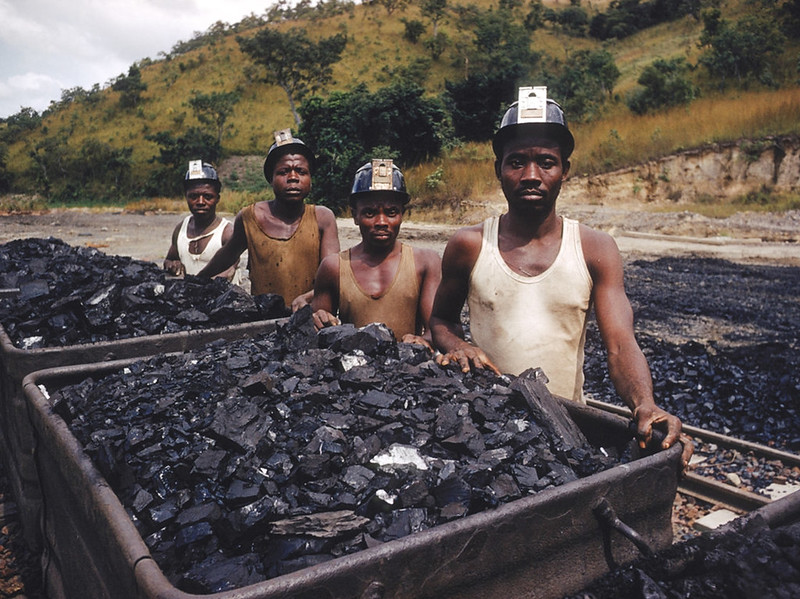 Coal Mining in the Enugu district more to come ...... 31 Likes 12 Shares |
| Re: Nigerian States And What They Produce by scholes0(m): 8:51pm On Aug 12, 2015 |
[size=14pt]Iron Ore Production, Nigeria[/size] Due to the influence of its vast oil resources. The domestic mining industry is underdeveloped, leading to Nigeria having to import minerals that it could produce domestically, such as salt or iron ore. The Agbaja mine is a large iron mine located in central Nigeria in the Kogi West district. Agbaja represents one of the largest iron ore reserves in Nigeria and in the world having estimated reserves of 1.5 to 2 Billion tonnes of ore grading 48%-53% iron (Fe) metal. https://en.wikipedia.org/wiki/Agbaja_mine . Other significant reserves in Nigeria include:Koto Karfe (Kogi state): 850 Million Tons. Itakpe (Kogi state) 310 Million Tons. Kogi is Nigeria's dominant Iron ore player. Other States where iron ore occurrences have been discovered include Nasarawa, Sokoto, Kaduna, Oyo, Osun, Bauchi, Borno and Benue. There are over 5 billion metric tonnes of iron ore deposits in the countryhttp://synterra.co/index.php?option=com_content&view=article&id=72%3Airon-ore-deposits-nigeria&catid=49%3Airon&Itemid=77&lang=en http://www.australianmines.com.au/sites/4e12ba9050ee853e770086de/contents/content_instance/5044320150ee851ef6000da3/files/nigeria__minister_of_mines_presentaion_at_africa_down_under_.pdf  [size=14pt]Cotton Production, Nigeria[/size] Cotton as a major cash crop, is of considerable social and economic importance to Nigeria.Cotton/textile activities are widespread in the country. Cotton production in Nigeria dates back to 1903 with the British Cotton Growers Association taking the lead until 1974. The traditional cotton growing areas are concentrated in Northern and South Western Nigeria, In the Savannah belts of the country: Kaduna, Ondo, Kano, Katsina ,Oyo, Kwara, Ogun Zamfara, Jigawa, Sokoto, Kebbihttp://agronigeria.com.ng/2013/05/21/nigeria-ogun-set-to-be-highest-producer-of-cotton-in-africa/ http://www.thetidenewsonline.com/2012/09/05/reviving-cotton-production-in-nigeria/  [size=14pt]Seafood Production, Nigeria[/size] Seafood includes Mainly Fish (which is the sea dwelling specie harvested annually), but also, shrimps, periwinkles, clams, oysters, Crayfish Etc. Of the 36 states in the country (Nigeria), 9 (Lagos, Ogun, Ondo, Edo, Bayelsa, Rivers Akwa Ibom and Cross River) are located in the coastal zone.http://www.academia.edu/4429514/Effects_of_Flooding_and_Erosion_on_Fisheries_Resources_in_Niger_Delta_Nigeria ftp://ftp.fao.org/fi/document/fcp/en/FI_CP_NG.pdf 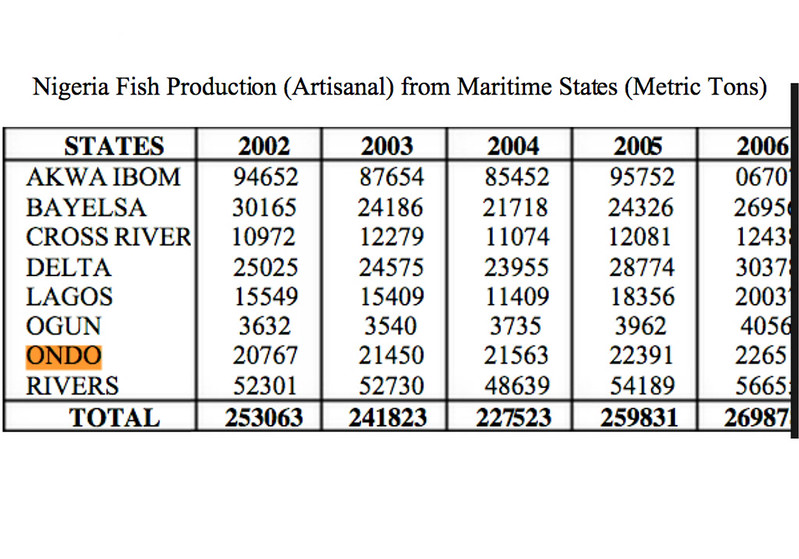 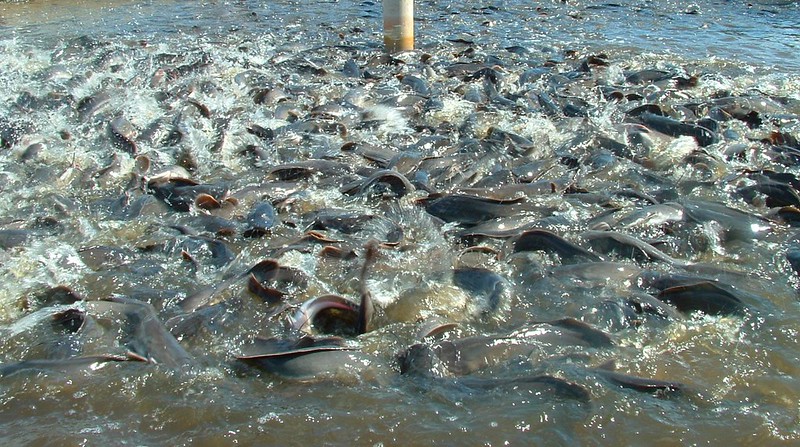 [size=14pt]Rice Production, Nigeria[/size] Nigeria is by far West Africa's largest rice producer. The rice producing areas can be subdivided into the Rain fed upland (30%), The Rain fed lowlands AKA "Fadama (47%), Irrigated (17%), and Deep water floating production (5%). The main areas of rice cultivation in the country include the middle belt and Northern states of Benue, Borno, Kaduna, Kano, Niger and Taraba, as well as the South Eastern states of Enugu, Cross River and Ebonyi. Kaduna is the main producing state, followed by Niger, Benue, Ebonyi, Taraba, Kano and Borno The latter seven states account for over 67 percent of total rice production in the country.http://www.fao.org/3/a-at581e.pdf 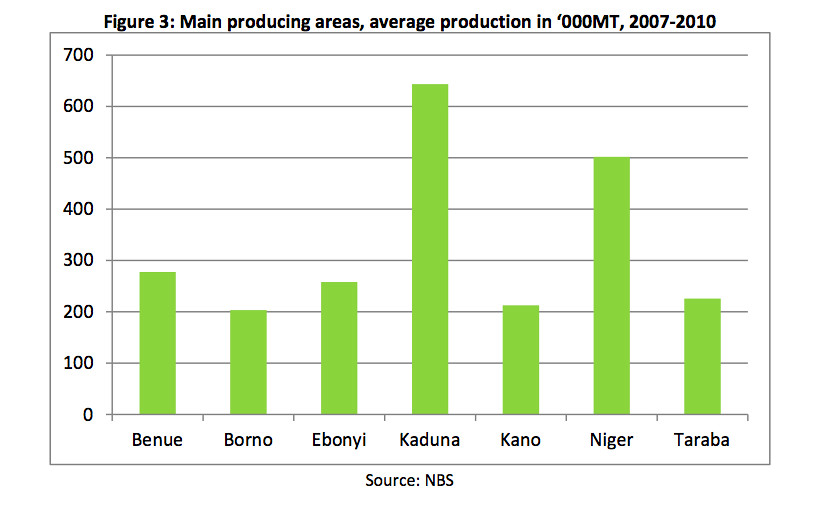 [size=14pt]Citrus Production, Nigeria[/size] In Nigeria, about 3.4 Million metric tonnes of citrus fruits are produced annually (2013) from an estimated hectarage of 3 million hectares of land (FAO, 2008). The country is the 9th major citrus fruit producing country globally, just after italy. And the largest growing region in Africa, followed by Egypt, Morocco and South Africa.http://www.eduresourceworld.com/2013/08/fruits-are-natural-staple-food-of-man.html 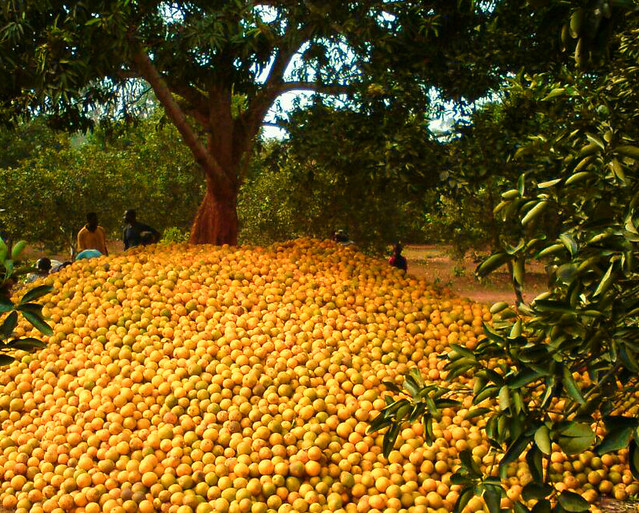 [size=14pt]Tin (cassiterite) and Columbite Production, Nigeria[/size] Nigeria is blessed with Huge Tin Ore reserves. Nigeria’s Jos Plateau, was once the hub of a mining industry which fed European demand for tin through much of the 20th century. Tin mining in Plateau began in October 1904 when the British colonial government sent a mineral-survey team to assess the mineral deposits within the region. Tin deposits were discovered in the Jos-Plateau area and foreign companies were allowed by the colonial regime to operate in the territory and mine the resources, using mechanised equipment which helped to curb the risks and prevent the death of the mine workers. Today, Nigeria is the second largest tin producing country in Africa, just above Russia globally , Although it has the reserves to sustain a much larger production with more investment. Nigeria's reserves are located in Plateau, Kano, Ondo, Nassarawa, Kwara, Bauchi, and Osun states https://farm6.staticflickr.com/5784/20516835932_0e20a76c9e_o.jpg https://en.wikipedia.org/wiki/List_of_countries_by_tin_production www.scirp.org/journal/PaperDownload.aspx?paperID=5259 [img]http://images.bwbx.io/cms/2012-08-23/feature_tin35__01__630x420.jpg[/img] [size=14pt]Sugar and Sugarcane Production, Nigeria[/size] Sugar cane production is mainly located in the North Western region of the country with Kano State accounting for 30% of the national production (NBS) (2009). The border states of Kano, namely[b] Jigawa, Kaduna and Kastina[/b], represent respectively 8%, 13% and 13% of the domestic production. Two other regions remain important in terms of production: (Kebbi and Sokoto) as well as the North East (Taraba and Adamawa).  [size=14pt]Banana and Plantain Production, Nigeria[/size] Nigeria is one of the largest banana and Plantain (Mussa .spp) growing countries in Africa. Nigeria produces 2.74 million tonnes of banana annually, according to the Food and Agriculture Organisation (FAO). It is also the largest plantain producing country in West Africa., making the crop one of the important staples in the country.The main Banana and Plantain growing regions in Nigeria are found in the South and Central regions of Nigeria, the largest quantities are produced in Edo, Ondo, Delta, and Ogun States. Other producing states are Rivers, Cross River, Oyo, Akwa Ibom, Ebonyi, Ekiti, Imo, Plateau, Osun, Bayelsa, Kogi, Abia, Anambra and Enugu. Plantain cultivation is not limited to big plantation but is often grown in small orchards which sometimes go unnoticedhttp://projectsxtra.com/mobile/Projects/147.html http://www.foramfera.com/index.php/news-and-press-release/item/609-plantain-cultivation-in-nigeria-the-investment-opportunity  30 Likes 11 Shares |
| Re: Nigerian States And What They Produce by hakeem4(m): 8:52pm On Aug 12, 2015 |
Okay |
| Re: Nigerian States And What They Produce by Brightology2(m): 8:52pm On Aug 12, 2015 |
Jst imagine wat d abokis are producing,groundnut,tomatoes,na wa o 18 Likes 2 Shares |
| Re: Nigerian States And What They Produce by oduastates: 8:55pm On Aug 12, 2015 |
The only recurring factor. Oodua states. The land of God Every thing that grows under the sun in this part of the world ,grows in The Yoruba country . Beans ,vegetable ,cotton ,all sorts of fruits etc . If we decided to start planting Tomatoes today , we will become self sufficient in a few years . The farming settlements around places like iseyin , ilesha , esa oke , Owo ,akoko Edo ,Ore are so productive that .................. In short , the only places which can hold a candle to the homeland are benue , edo , cross river . Poultry: chickens ,chicks , cockerel, ducks 1 Oyo 2 Ogun 3 Osun 4Ondo Animal feed production 1 Oyo 2Ogun 3 Ondo 4 kwara Banana and plantain Osun lo ni Ondo next Edo Kolanut Ondo lo ni Osun Oyo Piggery Oyo na the baba Even yet , it is still not good enough . The yield per hectare of land is still low . Ban okada( has decimated the car -taxi ranks) in the SW and any citizen willing to take up Agriculture should be assisted by the government of odua States . 106 Likes 7 Shares |
| Re: Nigerian States And What They Produce by Sandydayz(f): 8:59pm On Aug 12, 2015 |
Impressive... Am looking forward to the time for agriculture...  6 Likes 1 Share |
| Re: Nigerian States And What They Produce by Young03(m): 9:03pm On Aug 12, 2015 |
For ur effort not to be in vain make i help u beg lalaclaticla...move am to front page 3 Likes |
| Re: Nigerian States And What They Produce by Nobody: 9:03pm On Aug 12, 2015 |
Brightology2: The major source of foreign reserve in Thailand is Rice and rice related product. And their per capita income is higher than Nigeria. Dont down play Agriculture. if well manage it can raise Nigeria economy to a very high level. United State is d number 1 exporter of food in the world. United State of America makes about 120 billion dollars yearly on agricultural export while Nigeria makes less than 40 billion dollars on crude oil sale. However because of laziness and poor management, Nigeria is not maximizing its agricultural potential which can equal oil revenue if well planned and managed Edo State tend to have most of the things in terms of varieties not volume per product in Southern Nigeria. 147 Likes 8 Shares |
| Re: Nigerian States And What They Produce by omokab: 9:08pm On Aug 12, 2015 |
Nice one.but you missed Osun state among palm oil producing state. I'm sure is a mistake I know Osun state produce palm oil even more than Oyo especially Ikire,Apomu,ife axis. 16 Likes 2 Shares |
| Re: Nigerian States And What They Produce by courage89(m): 9:13pm On Aug 12, 2015 |
Nice |
| Re: Nigerian States And What They Produce by Alphaoscar: 9:13pm On Aug 12, 2015 |
@ Op, Some angry wailers will soon aim for your head over this matter so I will advice you to cover yourself with the blood of whatever you believe in. They are practically born to wail!!! 45 Likes 3 Shares |
| Re: Nigerian States And What They Produce by OfoIgbo: 9:15pm On Aug 12, 2015 |
I am waiting for oil and gas records. Now those are the real money-making sectors. And perhaps Nollywood also 10 Likes 2 Shares |
| Re: Nigerian States And What They Produce by CHM11: 9:20pm On Aug 12, 2015 |
Excellent, things like this are what makes this site rock. Lalasticlala 7 Likes 1 Share |
| Re: Nigerian States And What They Produce by gebest: 9:36pm On Aug 12, 2015 |
Pls include Edo in the cashew production, edo has cashew more than the states u mentioned. 12 Likes |
| Re: Nigerian States And What They Produce by fashoo2010(m): 9:42pm On Aug 12, 2015 |
Wow...just that we don't give attention to agriculture again, d north is really leading in agriculture followed by south west.. Only if we can go bak to agriculture, we need to diversify from only oil. The only issue is, everyone is running away from farm work... I tink d govt need to make agriculture attractive, put some measure in place to maintain d agriculture produce and management of it... 26 Likes 1 Share |
| Re: Nigerian States And What They Produce by Rawani: 9:45pm On Aug 12, 2015 |
Nice. This is why Agriculture must be aggressively developed in this country. The revenue potential is beyond what oil currently offers us, especially considering its falling value, availability of shale, and the increasingly hostile competitive market. President Buhari's plan to effectively diversify our mono-economy should be implemented in an accelerated manner. The huge deposits of solid minerals, added to revenue from agriculture will go a long way to buffer our departure from our helpless reliance on crude oil. 30 Likes 1 Share |
| Re: Nigerian States And What They Produce by coolitempa(f): 9:50pm On Aug 12, 2015 |
oduastates: The blessed ones.....always leading....all the way.....  ...where r d Igbos...... ...where r d Igbos...... .....I expect some lamentation to start...... .....I expect some lamentation to start......  26 Likes 2 Shares |
| Re: Nigerian States And What They Produce by lonelydora: 9:51pm On Aug 12, 2015 |
Op never hear of BIAKPAN RUBBER in Abia State and AKPU OPANDA (Cassava of Opanda) in Enugu State. I'm here to read comments. 4 Likes 1 Share |
| Re: Nigerian States And What They Produce by kennydee05(m): 9:52pm On Aug 12, 2015 |
All states are important to national development 17 Likes |
| Re: Nigerian States And What They Produce by Pavore9: 9:52pm On Aug 12, 2015 |
Anambra produces rice. 12 Likes 1 Share |
| Re: Nigerian States And What They Produce by bash4us(m): 9:52pm On Aug 12, 2015 |
Blessed is a country. Caused by its management. 3 Likes 2 Shares |
| Re: Nigerian States And What They Produce by memeguy: 9:52pm On Aug 12, 2015 |
SS3 Geography all over again. 3 Likes |
| Re: Nigerian States And What They Produce by Nobody: 9:53pm On Aug 12, 2015 |
AND MAIDUGURI PRODUCES CRUDE OIL.      2 Likes |
| Re: Nigerian States And What They Produce by MrCounselor: 9:53pm On Aug 12, 2015 |
Am so sure some states are producing Stewpidity. 7 Likes |
| Re: Nigerian States And What They Produce by afolwalex20(m): 9:53pm On Aug 12, 2015 |
So nothing is produced in kwara state  1 Like |
| Re: Nigerian States And What They Produce by allanphash7(m): 9:53pm On Aug 12, 2015 |
Why dying for crude alone? 5 Likes 1 Share |
| Re: Nigerian States And What They Produce by ITbomb(m): 9:54pm On Aug 12, 2015 |
Imo State = Babies  31 Likes 1 Share |
| Re: Nigerian States And What They Produce by kenedy175(m): 9:54pm On Aug 12, 2015 |
NIGERIA is blessed! When will all this politicians just die?  11 Likes |
| Re: Nigerian States And What They Produce by PentiumPro(f): 9:54pm On Aug 12, 2015 |
Pavore9:Yes, at subsistence level for family consumption  26 Likes 1 Share |
| Re: Nigerian States And What They Produce by sukkot: 9:54pm On Aug 12, 2015 |
na only coal SE dey produce ? walahi this biafra cannot work with no food to eat  69 Likes 5 Shares |
| Re: Nigerian States And What They Produce by wellmax(m): 9:54pm On Aug 12, 2015 |
Ok. Who are the producers of armed robbers, ritualists, kidnappers, drug pushers, militants, prostitutes and baby factories? 34 Likes 3 Shares |
| Re: Nigerian States And What They Produce by trigar12(m): 9:54pm On Aug 12, 2015 |
We have too much mineral resources in this country ... Why did we abandon agriculture sef   2 Likes |
(1) (2) (3) (4) (5) (6) (7) (8) (9) (10) ... (18) (Reply)
Ekiti 2018 Governorship Election Results From Polling Units & Wards (Unofficial) / 2019 Presidential Election: Live Updates And Reports / Osun Governorship Election 2022 Results (Live Updates)
(Go Up)
| Sections: politics (1) business autos (1) jobs (1) career education (1) romance computers phones travel sports fashion health religion celebs tv-movies music-radio literature webmasters programming techmarket Links: (1) (2) (3) (4) (5) (6) (7) (8) (9) (10) Nairaland - Copyright © 2005 - 2024 Oluwaseun Osewa. All rights reserved. See How To Advertise. 79 |